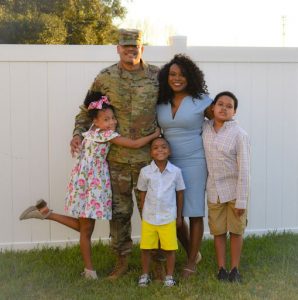Published: July 14, 2021
 Military life comes with a unique set of challenges for all families—from deployments to frequent moves, time away for training, and the general unpredictability of not knowing what lies ahead, just to name a few. But what happens when your family is thrown an extra curveball? For example, when you have one or more loved ones with needs that qualify them as an “Exceptional Family Member”? Navigating the uncertainty of military life with a child or spouse who has specific, and sometimes extensive, medical or educational needs can feel overwhelming at best.
Military life comes with a unique set of challenges for all families—from deployments to frequent moves, time away for training, and the general unpredictability of not knowing what lies ahead, just to name a few. But what happens when your family is thrown an extra curveball? For example, when you have one or more loved ones with needs that qualify them as an “Exceptional Family Member”? Navigating the uncertainty of military life with a child or spouse who has specific, and sometimes extensive, medical or educational needs can feel overwhelming at best.
According to the 2020 Military Family Lifestyle Survey, 24% of active-duty family respondents report their family was enrolled in the Exceptional Family Member Program (EFMP), a program that is intended to ensure family members’ special needs are considered during the assignment process. Most active-duty spouses who were enrolled in the EFMP were enrolled for a child (75%), but 42% were enrolled for themselves, and 4% were enrolled for their spouse.
When Marla fell for a member of the U.S. Army Reserve, she had no idea what would be in store for her—that navigating the realities of being an EFMP family would be a daily challenge. “My husband and I met when he was training at Fitzsimons Army Medical Center in Aurora, CO,” Marla recalled. “I worked as an executive administrative assistant at the hotel where the soldiers stayed. One day, a group of soldiers approached me in the hotel’s lobby asking where the restaurants and other local attractions were. I told them I wasn’t sure because I spent my Friday nights at the laundromat. Of course they all groaned in dismay…except one. One soldier replied, ‘I’ll go do laundry with you.’ We were married 30 days later.”
Thirteen years later, they are now an active-duty family with three kids. They’ve moved five times, experienced two deployments, and too many short-term separations for trainings to count. While those experiences on their own are difficult, when their oldest son was diagnosed with autism, Marla and her husband faced even greater challenges that came with a great deal of fear and anxiety. As she did her best to find support and care for her son, Marla sadly found that he was often ostracized, not just because of his autism, but also because of the color of his skin.
“Making sure my oldest receives an education weighs heavily on my husband and me,” Marla shared. “Attending schools where other children don’t look like him or behave in the same manner can be hard. His academic needs have been pushed aside by multiple school districts. He has been unfairly punished and even neglected by school staff on a number of occasions. I’m afraid that he will end up an uneducated adult man of color who will be ostracized or worse, punished by society.”
What’s at stake if Marla doesn’t feel they can find adequate care and quality education for her son? The military may lose a talented service member. In fact, over a third (38%) of active-duty service member respondents to the 2020 Military Family Lifestyle Survey report that “concerns about the impact of military life on my family” was a reason they would choose to leave military service, making it the most common reason.
What would help Marla and her family continue to thrive within the military community? Representation, especially when it comes to military family advocates. “Diverse representation is important because it provides a sense of equality within the ranks and within our military community as a whole,” Marla said. “If our leaders don’t look like us, they can’t truly understand our plight or advocate properly for our needs. They can hear our woes, but when it comes to raising our concerns, they fall short. Having access to advocates for our children as an exceptional needs Army family is critical. We need an EFMP program that we can truly rely on to assist us in the challenges we face from one city to the next. Someone who also understands the additional concerns and questions we might have as a military family of color.”
The need to understand the unique questions, concerns, and challenges faced by our military families of color is where the Racial Equity and Inclusion Initiative (REI) was born. Representation was quickly identified as a primary issue to be addressed. To lay the foundation for that change, Blue Star Families’ DEPLOY Fellow Program was created.
“DEPLOY Fellows is a Blue Star Program within our Racial Equity and Inclusion Initiative designed to diversify and expand the pipeline of leaders in the military community,” said Kathy Roth-Douquet, CEO and Founder of Blue Star Families. “The effort will embed and train individuals from historically underrepresented populations into Blue Star Families’ organization as paid staff in national and Chapter roles. Through our training, we’ll seed a new generation of leaders throughout the Veteran and military family support space.”
Ultimately, the REI and DEPLOY Fellows Program came to life as a result of hearing from and listening to military families like Marla’s. But the work doesn’t begin and end there. Take the survey to share your diverse experience as a military family of color. Tell us what challenges your family continues to face and opportunities you’re looking for to enrich life as a military family. Together, we can impact change to build a better military future for all families.
Posted In: Racial Equity and Inclusion
